#for gaius and lucius caesar
Text
Just finished Seianus Augustus, an article by Edward Champlin, which argues that Sejanus was not merely an outsider who connived to undermine the imperial family and insert his own descendants into it, but a rising heir-apparent who may or may not have been responsible for all those murders and conspiracies. Thought-provoking stuff, and it's nice to see a "flat" villain figure get more fleshed out.
I am also rotating in my mind the fascinating parallels Champlin draws between Tiberius/Sejanus and Augustus/Agrippa. The "partner of my labors." Saving the emperor from the brink of death. The second-in-command who gets things done, is great at administration and has an interest in the arts. There's even passages strongly suggesting that Sejanus was attracted to men.

But while Agrippa and Augustus' relationship appears to have been solid all their lives, something went terribly wrong between Tiberius and Sejanus. The usual narrative emphasizes Sejanus' manipulations, teachery, and even killing Tiberius' son. Champlin doesn't evaluate how true or false that narrative is, but he does hint that Sejanus might have been destroyed for a different reason: that he too openly revealed his ambitions, and Tiberius came to see him as a threat.
Agrippa, in contrast, usually avoided the spotlight and redirected people's attention back to Augustus. His marriage into the Julian family also appears to have been Augustus' idea, in contrast to Sejanus who actively sought a marriage tie. And Agrippa had an extensive track record in a variety of contexts by the time Augustus granted him the tribunician power (i.e. made him clearly the #2 guy in the empire), while Sejanus' record appears to have been mostly personal service to Tiberius. And, of course, Agrippa's personal life was virtually drama-free - although Champlin points out that we don't know how many of the allegations about Sejanus come from his enemies' smear campaign.
Anyway, a super interesting article, makes me want to reread my biographies of Tiberius and examine Sejanus' role again.
#i do think champlin overstates the certainty of agrippa being augustus' designated heir#like it's very plausible given the signet ring incident but i think it's more likely he'd want agrippa as a regent#for gaius and lucius caesar#edward champlin#sejanus#tiberius#marcus agrippa#jlrrt reads#seianus augustus#octagrippa#jlrrt essays
58 notes
·
View notes
Text
If you were going to pin the BEGINNING of the downfall of the Roman Republic on the actions of one Roman
#roman history#ancient rome#roman empire#how often do you think about the roman empire#ancient history#julius caesar#pompey#caesar#pompeius magnus#the roman empire is my roman empire#gaius gracchus#gaius julius caesar#gaius marius#marian reforms#tiberius gracchus#the gracchi#sulla#lucius cornelius sulla#marcus licinius crassus#crassus#Pompey the great#i will cry over every vote for Pompeius
143 notes
·
View notes
Text
BEWARE.....them

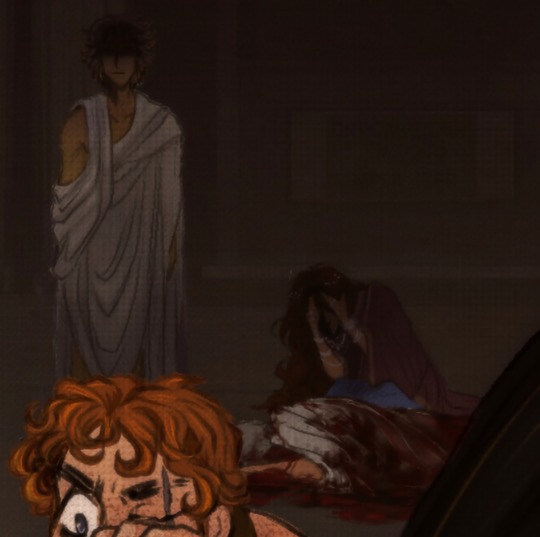
[ Ides 2023 that deserves a repost]
Foreground: Cinna, Casca, Decimus, Brutus, Metellus, g.Casca, Titinius, Cassius
Background: Antony, Calpurnia, Caesar- at least.. it WAS Caesar. 🫡🙏🏻😔
#julius caesar#republic comic#beware the ides of march#caesar needed to beware them#ides of march#cinna#casca#decimus#brutus#metellus#g.casca#titinius#cassius#antony#calpurnia#caesar#lucius cornelius cinna#publius servilius casca longus#decimus junius brutus albinus#marcus junius brutus#metellus cimber#gaius servilius casca#marcus antonius#calpurnia pisonis#gaius julius caesar
36 notes
·
View notes
Text
If I had been at the Stabbening you know I would have consumed him. Sulla might have haunted his narrative but at the end it's still me slurpin
32 notes
·
View notes
Text
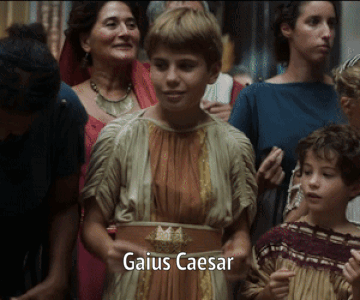






Domina and the children of the next Julio-Claudian generation
#domina sky#domina mgm+#julio-claudian dynasty#julio-claudians#gaius caesar#julia the younger#julilla#lucius caesar#germanicus#germanicus julius caesar#drusus the younger#claudia livia#livilla#technically germanicus wasn't called germanicus until his father's death#and i am not sure how was it with castor's nickname#missing are agrippina postumus and claudius who are not there except only in extreme background#hope we will see more of the kids next season#it's terrible to realize that most of these kids will die young with a lot of ???? around their deaths or in exile#life expectancy of julio-claudians really declines with each successive generation#like it's around 40 for this generation
65 notes
·
View notes
Text
THEORY: Roman Republic died because of father issues
PROOF: Her last fathers were
Gaius Marius: Father of failson
L. Cornelius Sulla: A daddy not a father
He Who Speaks: Dolabella marriage, Octavian situation, Cicelina fic
Every man's WIFE: Self evident
CONCLUSION:
Cicero and Hortensius should have fucked nasty on the rostra. SPQR
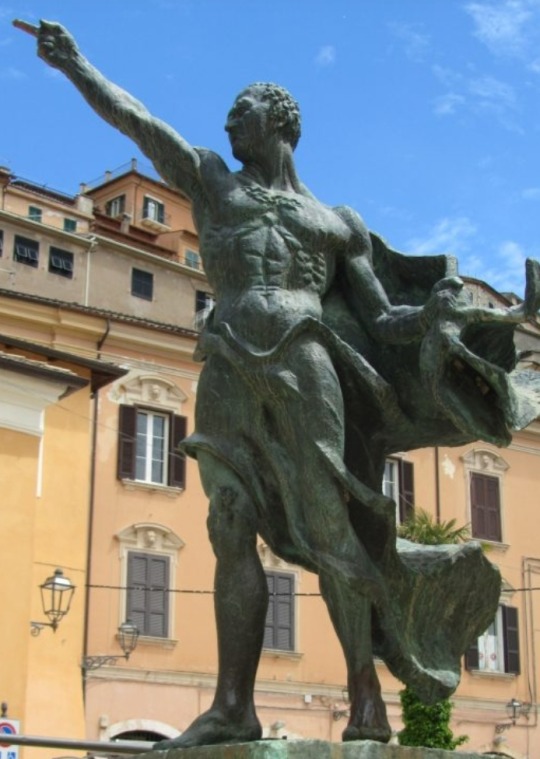
16 notes
·
View notes
Text

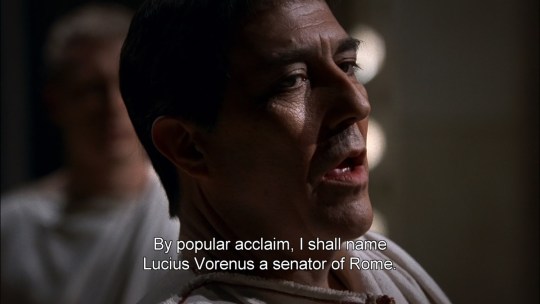


16 notes
·
View notes
Text
Credit to abraxas-calibrator OBVIOUSLY. Someone posted it on insta and I couldn't resist

#julius caesar#cassius#brutus#decimus#calpurnia#flavius#casca#marullus#titinius#cinna#antony#aniyah#gaius cassius longinus#marcus junius brutus#calpurnia pisonis#lucius caesetius flavus#lucius cornelius cinna#publius servilius casca longus#gaius epidius marullus#marcus antonius#aniyah the soothsayer#decimus junius brutus albinus
28 notes
·
View notes
Photo

Rome (2005)
“Every city has its secrets“
#2005#film#series#TV show#television#Rome#Roman Republic#Kevin McKidd#Lucius Vorenus#Ray Stevenson#Titus Pullo#Lyndsey Marshal#Cleopatra#Scott Chisholm#King Ptolemy XIII#Ciaran Hinds#Gaius Julius Caesar#James Purefoy#Mark Antony#Max Pirkis#Gaius Octavian#Kerry Condon#Octavia Of The Julii#Polly Walker#Atia Of The Julii#Alexandria#Egypt#gladius
24 notes
·
View notes
Text

Pullo and Vorenus
“In that legion there were two very brave men, centurions, who were now approaching the first ranks, T. Pullo, and L. Vorenus. These used to have continual disputes between them which of them should be preferred, and every year used to contend for promotion with the utmost animosity. When the fight was going on most vigorously before the fortifications, Pullo, one of them, says, "Why do you hesitate, Vorenus? or what opportunity of signalizing your valor do you seek? This very day shall decide our disputes." When he had uttered these words, he proceeds beyond the fortifications, and rushes on that part of the enemy which appeared the thickest. Nor does Vorenus remain within the rampart, but respecting the high opinion of all, follows close after. Then, when an inconsiderable space intervened, Pullo throws his javelin at the enemy, and pierces one of the multitude who was running up, and while the latter was wounded and slain, the enemy cover him with their shields, and all throw their weapons at the other and afford him no opportunity of retreating. The shield of Pullo is pierced and a javelin is fastened in his belt. This circumstance turns aside his scabbard and obstructs his right hand when attempting to draw his sword: the enemy crowd around him when embarrassed. His rival runs up to him and succors him in this emergency. Immediately the whole host turn from Pullo to him, supposing the other to be pierced through by the javelin. Vorenus rushes on briskly with his sword and carries on the combat hand to hand, and having slain one man, for a short time drove back the rest: while he urges on too eagerly, slipping into a hollow, he fell. To him, in his turn, when surrounded, Pullo brings relief; and both having slain a great number, retreat into the fortifications amid the highest applause. Fortune so dealt with both in this rivalry and conflict, that the one competitor was a succor and a safeguard to the other, nor could it be determined which of the two appeared worthy of being preferred to the other.”
Gaius Julius Caesar
The Gallic War
Book 5 Chapter 44
#quote#book#the gallic war#gaius julius caesar#titus pullo#lucius vorenus#rome#roman#spqr#the only mention of the pair in history#pullo pops up again during the following civil war fighting for pompey
18 notes
·
View notes
Text
Marius & Sulla: former friends who'd fought multiple wars together before their conflicting ambitions put them at each other's throats
Caesar & Pompey: former friends and in-laws who both tried to prevent their civil war before pride, suspicion and political pressures tore their alliance up anyway
Antony & Octavian: hate at first sight lmao
#mark antony#octavian#julius caesar#pompey#gaius marius#lucius cornelius sulla#just roman memes#jlrrt speaks
106 notes
·
View notes
Text
Who puts the dick in dictator?
#lucius cornelius sulla#sulla#gaius julius caesar#how often do you think about the roman empire#julius caesar#caesar#Cincinnatus#lucius quintus Cincinnatus#Cincinnati#my roman empire#roman history#ancient rome#roman empire#ancient history#roman republic#dictators#Roman dictators#the dictatorship#ides of march
15 notes
·
View notes
Text
The Ides of March have come.... But not gone
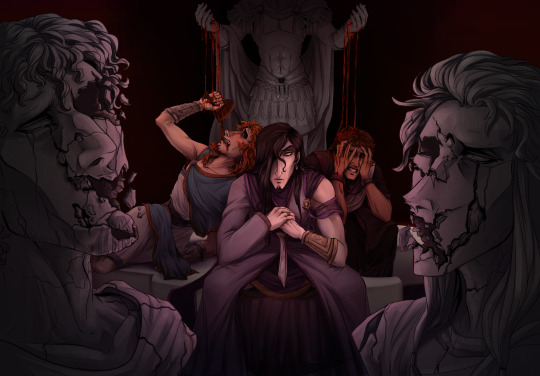
Ides 2022 repost because I worked ceaselessly on this
Starting from Left to Right: Marullus, Casca, Cassius, Brutus, and Flavius
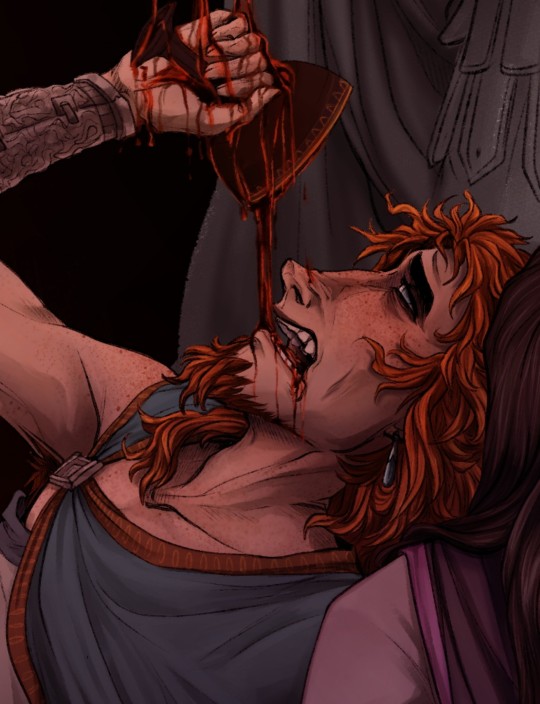

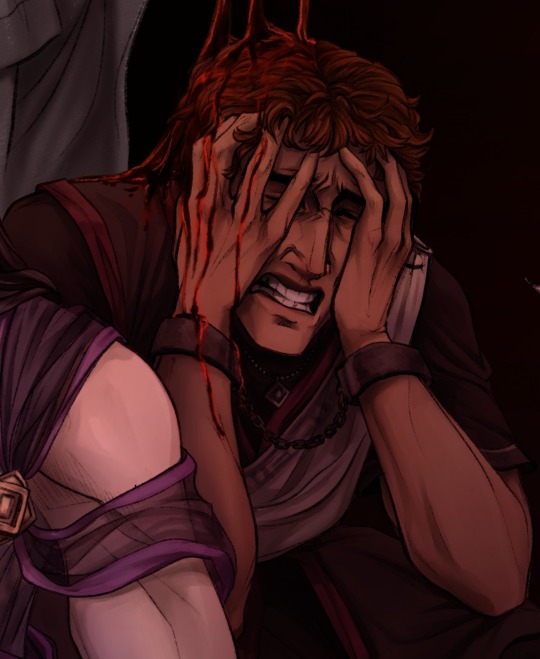
#julius caesar#republic comic#beware the ides of march#historical fiction#ides of march#gaius epidius marullus#publius servilius casca longus#gaius cassius longinus#marcus junius brutus minor#marcus junius brutus#lucius caesetius flavus#marullus#casca#cassius#brutus#flavius#caesar#symbolism#cw: dark content#cw: blood#julius caesar art#adaptation#ancient roman#ancient rome#roman#late roman republic#roman republic#the ides of march#oc#lgbt+
24 notes
·
View notes
Text
Surprise Bonus:
773 notes
·
View notes
Text
#forgot about catilina until the last moment and had to replace lucullus with him. sad. polls need more options#edit: extremely sad i forgot brutus on this. tremendous oversight
254 notes
·
View notes
Text
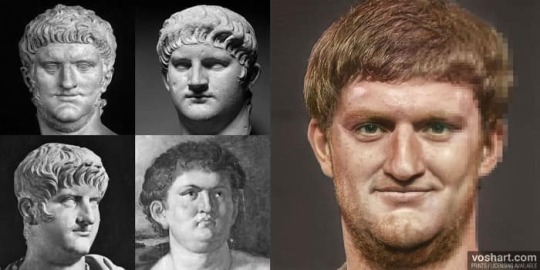
Nero: The end of the Julio-Claudian dynasty (Part I)
He was born on December 15, 37. His birth name was Lucius Domitius Ahenobarbus; When he was adopted by his great-uncle, the Emperor Claudius, his name changed to Nero Claudius Caesar.
Nero was born in the first year of his maternal uncle's reign. His mother, Agrippina, was in her prime, but a year and a half later, accused of treason she was banished. The little boy was left in the care of his paternal aunt Domitia. In the year 40, his father died.
In January 41, his uncle emperor Gaius ('Calígula) was assassinated. His great-uncle Claudius ascended the throne and brought Agrippina back. In 49, when he was 11 years old, his mother married her own uncle Claudius and becoming empress. He was adopted by emperor, and Agrippina appointed as his tutor the famous Hispanic philosopher, orator and politician Seneca.
At the age of 15 he was forced to marry 13-year-old Octavia, daughter of Claudius and Messalina.
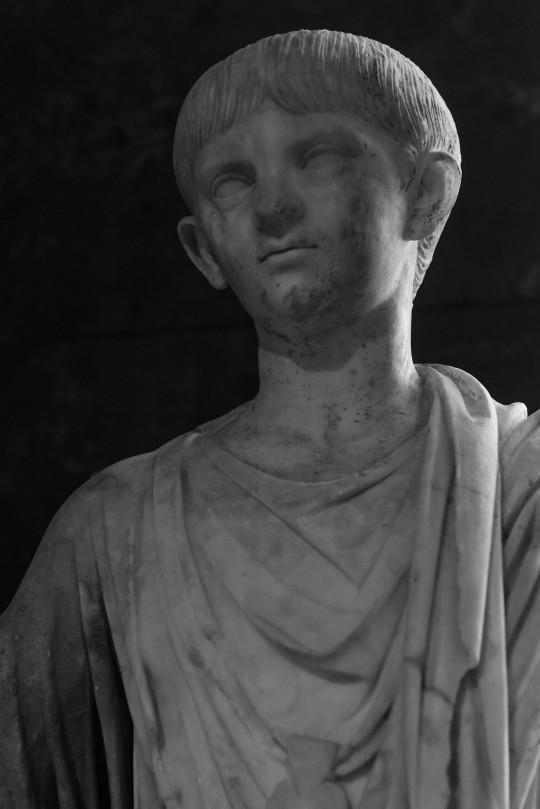
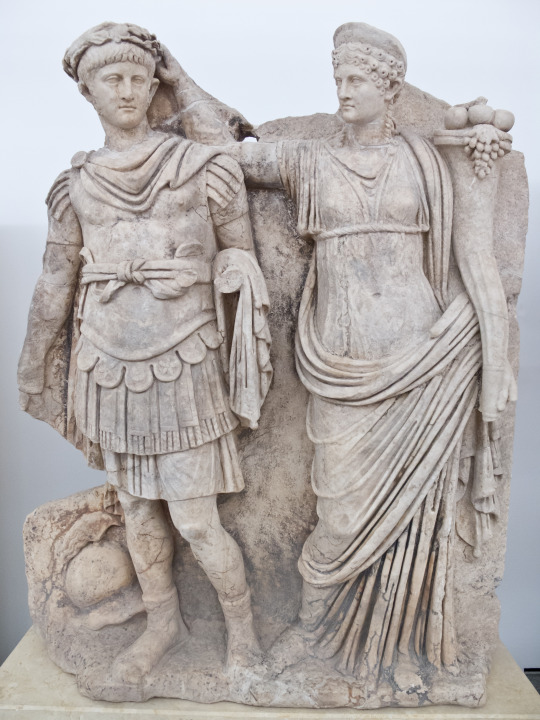
Marble portrait of young Nero, c. 50. Photo by Egisto Sani. Empress Agrippina and young emperor Nero. Photo by Carlos Delgado.
On October 13, 54, 16-year-old Nero became the youngest ruler in Roman history up to that time. Octavia, 14, became the new empress consort. And 25 years after Livia's death, Rome once again has an Empress Mother. The sculpture shows Agrippina crowning him, a clear message that he owes her the throne. This sculpture had hundreds of copies placed throughout the empire.
Something unprecedented happened in Roman coins. Agrippina appears alongside her son on the same side of the coin, as if she were co-ruler, and she was indeed. Those coins, minted at the obvious request of Agrippina, circulated until the year 57. In 58 her image was seen next to Nero with him in front. From the year 59, only the image of Nero would remain.
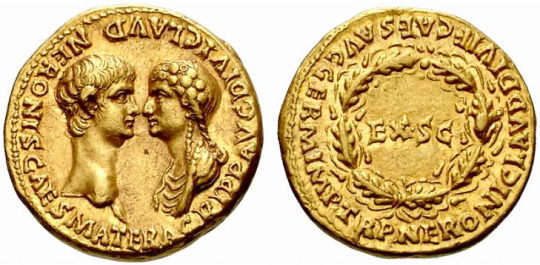
Four months of reign : The first murder?
According to Tacitus, Nero removed Agrippina's favorite freedman from his position as Secretary of the Treasury. Agrippina, feeling outraged, threatened to replace him with Britannicus: "Since Britannicus was the biological son of Emperor Claudius, he was therefore the true heir and would soon come of age (14 years) to rule."
According Suetonius :
"Nero sent for the poisoner Locusta and he forced her to mix as swift and instant a potion as she knew how in his own room before his very eyes. He tried it on a goat but the animal lingered for five hours. Had the mixture steeped again and threw some on a pig.; The beast instantly fell dead. Pleased, Nero ordered that the poison be taken to the dining-room and given to Britannicus. The boy dropped dead ins at the very first taste, and Nero lied; He said that Britannicus was sick and always fell suddenly.
The next day had him hastily and unceremoniously buried in a pouring rain. Nero rewarded Locusta for her eminent services, with large estates in the country."
According all sources: One day before his 14th birthday, on February 11, 55, Britannicus was at a banquet attended by his sister Octavia, Agrippina, Nero, and several important people, and suddenly fell death.
About this matter I must say that those writers contradict themselves since also assure that in the first three years of his reign, Nero lived in acceptable leisure in the palace and obeyed his mother. While Seneca, the prefect Sextus Afranius Burrus and Agrippina were the ones who ruled.
What is the true story? Nero was a young puppet emperor who lived relaxed and obedient to his mother during his first three years, or after four months of reign he was already making decisions and defying his mother? Not to mention the lack of credibility of the story about Nero and Locusta doing experiments with animals and poisons.
It's possible that the boy suffered from epilepsy. And it's possible that so that readers would not doubt that it was a murder, the writers related the death of Britannicus to the conflict between the emperor and his mother; A conflict that actually began three years later according to these same writers, and the coins confirm it.
On the other hand, experts assure that there is no poison ingested orally that instantly kills the victim as Suetonius describes.
The start of the trouble
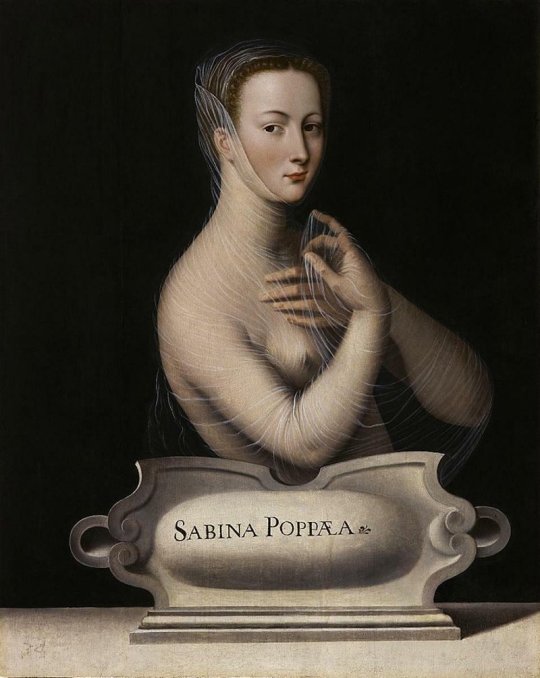
Portrait of Poppaea Sabina painted by an artist of the Fontainebleau School in 1570. Museum of Art and History, Geneva.
Early year 58. Nero at the age of 20 fell in love with Poppaea Sabina, wife of his friend Marcus Salvius Otho. They began an openly adulterous relationship and rumors of the scandal spread through the city. Agrippina was furious and took Octavia's side, surely not out of affection for her daughter-in-law but because such marriage was a matter of politics and authority. It was at this time that Nero began to become independent from his mother, as well as from Seneca and Burrus, and it was probably in that year that he dismissed Agrippina's favorite freedman.
Nero forced Otho to divorce Poppaea and appointed him governor of Lusitania. At that time this was a "dissembled exile" since Lusitania was the poorest and most boring province in the empire.
The fall and death of Agrippina.
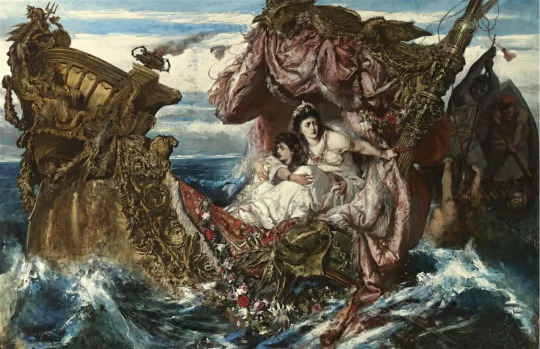
'The Shipwreck of Agrippina' by Gustav Wertheimer. XIX Century
Early 59. Agrippina was forced to retire to live in her villa in Misenum.
Historians claim that one day she and her friend Acerronia set sail with the helmsman Gallus in the Bay of Naples, and on the ship Nero had hidden men who were trying to kill her. They were on deck, under a canopy that had been secretly loaded with lead. At a given signal, the top fell, killing the helmsman and the ship began to sink. Agrippina swam quickly to shore when a man appeared in a boat shouting Agrippina's name; She remained silent but Acerronia shouted: "Here, I am!". The man, hitting her with the oar, killed her, believing she was Agrippina.
Tacitus wrote about it: "Nothing allowed of accidents as the sea." So, it really could have been an accident in which the helmsman and that lady drowned but not Agrippina who swam quickly or could be rescued. If it was an attack, a top-secret plan by Nero, how do they know the details with such precision? Is it possible that the writer, upon hearing the story of Agrippina's accident, created the story of an intricate attack?.
Time later, some guards arrived at the villa of Agrippina with the order to execute her on charges of conspiracy. According to Suetonius: "Agrippina showed them her bare belly and said one of them to stick his sword where her murderer had been conceived."
"After trying to kill his mother three times with poison and discovering that she had become immune thanks to antidotes, he manipulated the ceiling of her bedroom, devising a mechanical device to loosen the panels and let them fall on her while she slept. Agrippina discovered the plan, so Nero devised a folding boat to simulate a shipwreck." -Suetonius
Suetonius writes that Nero sent three men to kill her after learning of the failed attack in the bay. They also claim that this matricide was at the request of Poppaea, who according to them "she was a lady who had everything except decency".
The truth is that on March 23, 59, Agrippina the Younger died at the age of 43 in Misenum, after having lived an intense life of glorious and tragic moments. She died in the same city where, 22 years earlier her hated great-uncle Emperor Tiberius, had died.
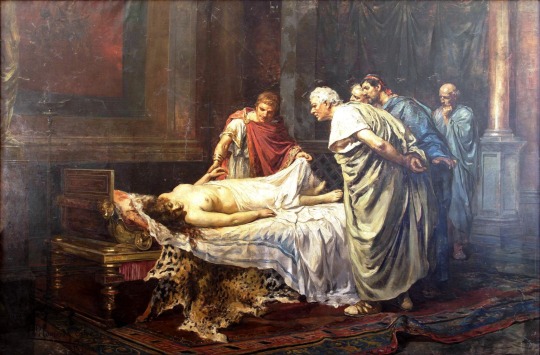
'Nero before the corpse of his mother, Agrippina the Younger ' by Arturo Montero y Calvo, 1887
Sources also claim that Agrippina's corpse was brought before Nero and he only said that his mother looked beautiful even in death.
Regarding this matter, I see three possibilities:
1: Nero fed up with the dominant behavior of her mother or at the simple request of Poppaea, decided to kill her even though she was already far from Rome and therefore could no longer bother them.
2: Agrippina, seeing herself deposed and stripped of her privileged position, simply decided to take her own life in her villa.
3: Furious with her son and for having lost what she had, she was plotting from Misenum, and Nero found out this ordered her execution or banishment. Knowing that she would soon be executed or banished, Agrippina decided it was better to committed suicide. This was a very common attitude in the ancient world.
Except for her sister Drusilla, all her siblings had died at the hands of others. Knowing the mentality of the ancient Romans, undoubtedly Agrippina decided not to suffer the same death as her siblings (if option 3 was what really happened).
But if Agrippina was really murdered, I think she was taken by surprise; While she was sleeping or unsuspecting with her back to the murderer. Resigned and theatrical attitude before the executioners, such as that described by Suetonius, is very un-Roman and very unlikely in the proud Agrippina the Younger.
Surely Suetonius wanted to belittle her, which is not surprising since in addition to the alleged incest with her brother "Caligula", Suetonius also claims that she tried to seduce her own son; then she couldn't die like a noble Roman lady. Furthermore, it became clear to me that Suetonius's style is inherently dramatic and sensational.
Also according to Suetonius from that time until his death the emperor was tormented by the ghost of his mother, and sought a magician to expel the ghost from the palace since Nero claimed that Agrippina was everywhere, especially at night. This could be true, or simply a Suetonius-style reaffirming account of Nero's guilt.
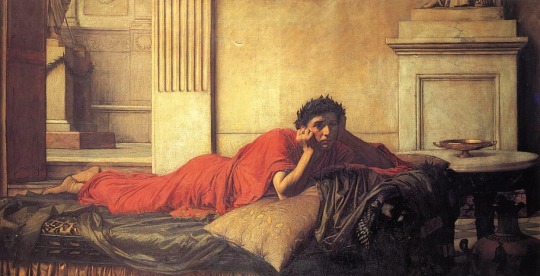
'The Remorse of the Emperor Nero after the Murder of his Mother' by John William Waterhouse, 1878
101 notes
·
View notes